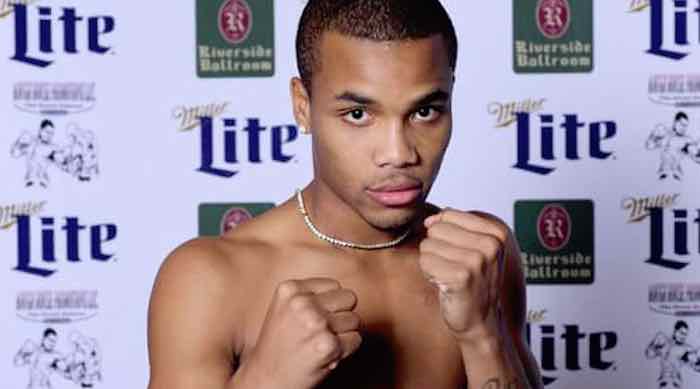The Windy City's oppressive gun laws couldn't save him
Star Chicago boxer's murder still unsolved three months later

--
BombThrowers:
When Ed "Bad Boy" Brown was murdered last December in Chicago, his case received enormous media coverage, but three months later it remains unsolved, seemingly destined to become a cold case.
Brown was 25 when he died Dec. 4, a day after being shot at 1:10 a.m. on West Warren Avenue in the neighborhood of East Garfield Park. Brown's death was immediately lapped up by the media, with television, radio, and print stories flooding Chicagoland for days. National media also picked up the story. East Garfield Park is the fourth most violent neighborhood among the 77 tracked in the city,
according to statistics compiled by the ChicagoTribune.
When he died, he was 20-0 as a middleweight boxing contender.
DNA Chicago said that "boxing experts, commentators, fans, and his management...considered [him] the 'uncrowned champion' of the welterweight division."
President Donald Trump recently
observed:
I mean, you look at the numbers in Chicago. There are two Chicagos, as you know...There's one Chicago that's incredible, luxurious and all and safe. There's another Chicago that's worse than almost any of the places in the Middle East that we talk about, and that you talk about every night on the newscast.
The savage, relentless violence is why some now call Chicago "Chiraq," a portmanteau of Chicago and civil unrest-torn Iraq.
In East Garfield Park, and areas like it, Chicago's strict gun control policy has done little to stop guns from landing in the hands of gang bangers. East Garfield Park and surrounding areas are home to such notorious gangs as the Vice Lords, the Black P Stones, and the 4 Corner Hustlers. They have no problem getting guns, legal or otherwise.
Those who live in safe neighborhoods are completely unaffected by the violence in areas like East Garfield Park, Englewood, Woodlawn, and Chatham. Those in fancy neighborhoods -- Lake View, Gold Coast, and Lincoln Park -- possess much of the city's wealth and power; until they personally experience violence real solutions aren't likely to come. All the anti-gun legislation city fathers can dream up in their statist brainstorming sessions won't make any difference at all. For those insulated from the violence, it amounts to little more than a statistic that embarrasses their city but has no effect on their daily lives.
Brown had a rough upbringing. His father spent much of Brown's childhood in prison. His mother died tragically in 2003, one of 21 who perished in a human stampede at the E2 nightclub. When security used pepper spray to break up a fight, some patrons panicked and mistakenly thought it was a terrorist attack.
In 2012, Brown was shot non-fatally in a drive-by during the trials for the U.S. Olympics boxing team, costing him his expected spot. He survived getting shot again in the chest in a nightclub near his home a week after his first fight, which took him away from boxing for six months.
He came back, winning two more fights until he was shot once again.
In that incident, he was riding on a party bus when two men quarreled; when the argument escalated to gunplay, Brown caught a stray bullet.
His good friend,
rapper King Louie, moved away from Chicago after being shot in the head.
"Two weeks ago, my girl's little brother was sitting in a car with his friend and another car pulled up and shot his whole car up. Both of them died. It hurt me so bad. He was a good person. He wasn't involved in no crime or nothing like that,"
Brown told Mel Magazine, in a feature months before his death, about his girlfriend's brother who was murdered.
Of course, Chicago's tough anti-gun laws were ineffective.
The circumstances of Brown's shooting on Dec. 3, 2016 remain murky. He had just come back from a midnight training session at a local fitness club, X Sport, and was sitting in his car with his 19-year-old sister when a silver-colored vehicle pulled up and someone inside sprayed his car with bullets.
Brown was shot in the head and died at the hospital the next day. His sister was shot in the leg and survived.
Tips came in on his case for a few days and then stopped abruptly.
Though the crime may yet be solved, every day it doesn't resolution becomes more unlikely.
When Sylvester Rainge --
the city's next murder victim -- died, his story had none of the news appeal.
Since Brown's murder, more than 140 people have been murdered,
according to data from DNA Chicago.
None of the subsequent murders was compelling enough to capture attention again.
Things were back to two Chicagos – the violence being nothing more than a statistical footnote in the story of "incredible Chicago," as Trump called it.
"I love Chicago," Brown said when an interview discussing the death of his girlfriend's brother.
"I'll love Chicago till the day I die. I'm happy for any Chicagoan -- black, white, Mexican -- that's doing good. But all I can tell the kids is, get what you can and get out. Get yours and get up outta here, 'cause people gonna hate on you, gonna shoot at you and gonna kill you."
BombThrowers -- Michael Volpe -- Bio and
Archives |
Comments
Bombthrowers is a blog about politics and the war for the hearts and minds of Americans from a conservative viewpoint.
In line with our name, we do not hold back. We have a take-no-prisoners attitude when it comes to fighting for conservative principles. The Left doesn’t play nice, and that’s why they’ve been winning. It’s time for conservatives to rise up and turn the tide.
We’re not afraid to take on anyone, especially the Washington Establishment—Republican or Democrat.
Bombthrowers is a project supported by the Capital Research Center. Its editor-in-chief is Matthew Vadum.

